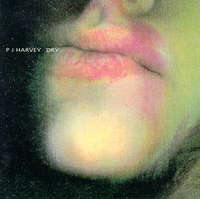| Columns Retired Columns & Blogs |
Recording of March 1993: Dry
PJ HARVEY: Dry
Too Pure/Indigo/Island 162-555 001-2 (CD only). Head, PJ Harvey, Robert Ellis, prods.; Head, eng. AAD? TT: 40:06
Too Pure/Indigo/Island 162-555 001-2 (CD only). Head, PJ Harvey, Robert Ellis, prods.; Head, eng. AAD? TT: 40:06
People who don't know any better than to write record reviews for a living have been stringing together words like "folk-punk-patty-smith-tori-amos-with-a-safety-pin-through-her-nipple" to describe PJ Harvey, the woman and the group, whose first album Dry is. It's all true as far as such market nichespeak goes, but it doesn't tell you that this is a band and a person with a lot to say if you can figure out the words, and almost as much even if you can't. (I mostly can't.)
 PJ Harvey (the band) is a power trio with punk instincts, a dramatic way with dynamics, always interestingly minimalist arrangements, a folk (yes) appreciation for just the right solo instrument, the rhythmic complexity of Cream or even Capt. Beefheart, a contempt for studio niceties, and fearless lyrics: "Long overdue.../ I'm happy and bleeding for you / I'm tired of bleeding for you." (Harvey says "Happy and Bleeding" is not about menstruation. Well...)
PJ Harvey (the band) is a power trio with punk instincts, a dramatic way with dynamics, always interestingly minimalist arrangements, a folk (yes) appreciation for just the right solo instrument, the rhythmic complexity of Cream or even Capt. Beefheart, a contempt for studio niceties, and fearless lyrics: "Long overdue.../ I'm happy and bleeding for you / I'm tired of bleeding for you." (Harvey says "Happy and Bleeding" is not about menstruation. Well...)
Polly Jean Harvey (the guitarist, the singer, the songwriter, the woman from Yeovil, England) is dead serious, and Dry is one serious album. Her voice quavers, shakes, whispers, and shouts in barely controlled, about-to-crack hysteria as she swears, in "Sheela-Na-Gig," that she's "Gonna take my hips to a man who cares," not one who tells her to "Wash your breasts / Take those dirty pillows away from me." In the October issue of Puncture, Harvey describes a Sheela-Na-Gig as "a Celtic stone carving...of a female figure crouching down, pulling her vagina open and laughing insanely."
This is pretty much the tone of Dry. Harvey yo-yos violently between enraged, screw-you feminism and total submersion in a primordial sensual soup transcending patriarchy and matriarchy, let alone mere sexual correctness. On the high-tension lines tying and binding those poles Harvey dances in spastic grace, spitting sparks of energy, rage, and passion as she claws out an anything-but-consistent self for herself. What we hear is a woman creating herself out of desperation, the survival instincts that come after hope dies, and a hard, hard joy in womanhood that demands celebration on its own terms: "Look at these my ruby-red lips / Look at these my child-bearing hips / Look at these my work-strong arms" ("Sheela-Na-Gig").
Even when I understand the words I sometimes think I'm listening to a foreign language—perhaps because I'm a 42-year-old man, and Harvey, who's young enough to be my daughter, sings in the strongest, most uncompromisedly female voice I've ever heard. But this tongue doesn't need translation; even were Harvey singing in Tzotzil, Dry would still be fascinating musically. In bassist Stephen Vaughan, drummer Robert Ellis, and her own guitar work, Harvey has built a lean, almost scrawny sound, a backup band for a hunger artist: as if Cream had grown up listening to the Sex Pistols instead of Robert Johnson, then gotten their first album produced by George Martin at his most astringent: Chas Dickie's cello on "Plants and Rags" is one of the best string solos I've ever heard in a rock setting. And the faintly oriental "Water" is in majestic 5/4, a time signature avoided by most bands PJH has already found itself lumped with. Songs start quietly, whispers over unaccompanied bass or guitar, slashed into by the full band at full volume; PJ Harvey sounds like it's/she's playing for its/her life.
As good as these songs are, their demo versions, originally released on two UK EPs and included on Drier, a bonus disc packaged with the UK edition of Dry, are even better: vocals more deeply felt and decipherable, even-more-stripped-down arrangements, and one more song conspicuous by its absence on Dry: "Dry" itself, in which Harvey delivers the ultimate female-to-male putdown: "You leave me dry."
The sound, boxy and very, ah, dry, is very faithfully that of a band rehearsing on the wall-to-wall in your own over-upholstered living room with the drapes pulled and the singer forgot her mike. No studio tricks, no fades, dynamics all sound entirely player-controlled. I could be wrong. I do not care. Turn it up, and forgive in advance PJ Harvey's almost-certain surrender to Second Album Syndrome. But who knows? PJ's only 22. Maybe we'll get lucky—again. Scary music for the frightened, brave survivors of the Sex Wars.—Richard Lehnert
- Log in or register to post comments



































